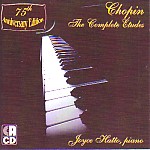[Editor’s Note: In the wake of the late-breaking scandal concerning the provenance of Joyce Hatto’s recordings, we had the option of removing all Hatto reviews, or leaving them intact and identifying the correct artists, to the extent possible, as we learn them. We have elected the latter, both as a caution and as a way to do some justice to the real artists as we learn their identities. So enjoy the review, but please refrain from purchasing this disc until we know who should get proper credit for it. DH]
Collectors aware of Joyce Hatto’s immense discography should note that these are not the late pianist’s 1992/97 Chopin Etudes, but rather are remakes from 2003. The playing is simply extraordinary. Who’d ever imagine that a relatively unknown 75-year-old woman could fuse technical finesse and musical insight in ways that surpass her younger, more famous colleagues? The evidence speaks for itself, beyond any reasonable doubt. In Op. 10, No. 1’s extended arpeggios ripple with consummate ease, No. 4’s rapid passages between the hands take on a conversational character with which few pianists bother, while the Black Key Etude (No. 5) and the F major (No. 8) boast irresistible lightness and wit. No. 6’s carefully orchestrated climaxes and harmonic density pay homage to Cortot (one of Hatto’s teachers) without in the least imitating him. No. 7’s skittish left-hand leaps are so pointed and alive that you almost forget Hatto’s super-supple double notes in the right hand.
The same can be said for one of the most elegant and effortless performances of the Etude in Thirds (Op. 25 No. 6) known to mankind. In the Revolutionary Etude Hatto gives the tumultuous left-hand arpeggios an extra kick by way of subtle accelerandos. Note also how Hatto takes Chopin’s elaborately varied articulations throughout No. 10 and Op. 25 No. 5 absolutely on faith, yet never sounds the least bit mechanical. Neither do the Octave and Winter Wind studies, where you hear freshly minted melodic patterns far beyond the imaginations of most conservatory hotshots.
The latter ought to be humbled by Hatto’s legato/staccato differentiation in the D-flat Nouvelle Etude, as well as by her unusually brisk yet seductively limpid take on the A-flat Nouvelle Etude. The clear, natural concert-hall ambience falls as easily on the ears as Hatto’s artistry. Granted, you may prefer one pianist or another in a particular selection, but you’ll have to search far and wide to find a more consistently satisfying Chopin Etude cycle on disc.
































